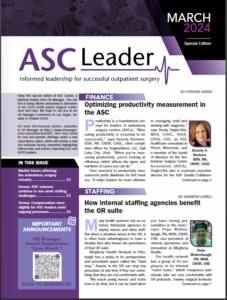
 Subscriber Content CMS proposes modifying ASC rule requiring staff radiology services
Subscriber Content CMS proposes modifying ASC rule requiring staff radiology services
Many ambulatory surgery centers (ASCs) have little need for a staff radiologist because only a few procedures require on-site imaging. Yet, ASCs are subject to a rule similar to those that require hospitals to keep radiologists on staff. That will no longer be true if a proposed change takes effect…
 Subscriber Content Faster procedures benefit patients and bottom line
Subscriber Content Faster procedures benefit patients and bottom line
Shortening the time it takes for an outpatient procedure may increase volume, OR utilization, and hence revenue—but that is not the point, say the nation’s top performers in a recent survey of procedure times. Rather, the purpose is to enhance patient safety and satisfaction. For example, less time in the…
 Subscriber Content ASCs jump on the surgical checklist bandwagon
Subscriber Content ASCs jump on the surgical checklist bandwagon
Since the early days of aviation, pilots have used checklists before, during, and after each flight. Cooks follow recipes. Builders don’t build without team meetings and signoffs at every step. Health care professionals, however, only recently began to adopt checklists. Often, the excuse has been that medicine is an art,…
 Subscriber Content ASC award winners share quality improvements
Subscriber Content ASC award winners share quality improvements
Surgical infection rates are dropping to zero, mammography results now arrive in minutes rather than weeks, and patient satisfaction surveys actually reflect patients’ interpretations of their experiences. This new world has arrived in some innovative locations, and it is poised to spread. The Accreditation Association for Ambulatory Health Care (AAAHC)…
 Subscriber Content Quality reporting for ASCs is off to a good start
Subscriber Content Quality reporting for ASCs is off to a good start
Starting October 1, 2012, the Centers for Medicare and Medicaid Services (CMS) began requiring quality reports on Medicare claim forms from ambulatory surgery centers (ASCs). From all indications, complications were few, and ASCs already are using the new statistics to gain insight into operational trends. Ultimately, the self-reports of patient…
 Subscriber Content Helping to avoid postdischarge nausea and vomiting
Subscriber Content Helping to avoid postdischarge nausea and vomiting
Nausea or vomiting after surgery can cause more distress than the pain, and even with modern anesthetics, it is not as rare as once thought. If the procedure is outpatient, symptoms may arise after the patient is at home, away from medical intervention. Thus, ambulatory surgery centers (ASCs) need to…
 Subscriber Content Surgery centers zero in on savings on supply costs
Subscriber Content Surgery centers zero in on savings on supply costs
While the nation concentrates on the consumer implications of health care reform, ambulatory surgery centers (ASC) are examining its provisions for clues to the impact it will have on their operations and revenue. One likely outcome is that the Patient Protection and Affordable Care Act (ACA) will transform their supply…
 Subscriber Content ASCs seek dialog on drug shortages, single-use vials
Subscriber Content ASCs seek dialog on drug shortages, single-use vials
A new villain has emerged in the struggle against drug shortages that continue to plague health care: the single-use vial. When a vial of injectable medication contains more than a particular patient needs, if the vial is designated “single-use,” the remainder must be discarded, according to recommendations from the Centers…
 Subscriber Content Survey: ASC economic conditions may be easing
Subscriber Content Survey: ASC economic conditions may be easing
Financial challenges may have eased slightly for ambulatory surgery centers (ASCs), according to the 22nd annual OR Manager Salary/Career Survey. Only 29% of ASC managers report financial difficulties because of current economic conditions, much lower than the 43% in 2010. Reasons cited for those financial difficulties have changed in the…
 Subscriber Content Staffing for surgery centers is in a holding pattern
Subscriber Content Staffing for surgery centers is in a holding pattern
A weak economy continues to affect staffing in ambulatory surgery centers (ASCs), according to the 22nd annual OR Manager Salary/Career Survey, with about 80% of nurse managers saying staff turnover stayed the same compared to 12 months ago, similar to 2011 results. Other staffing parameters are also similar to last…


